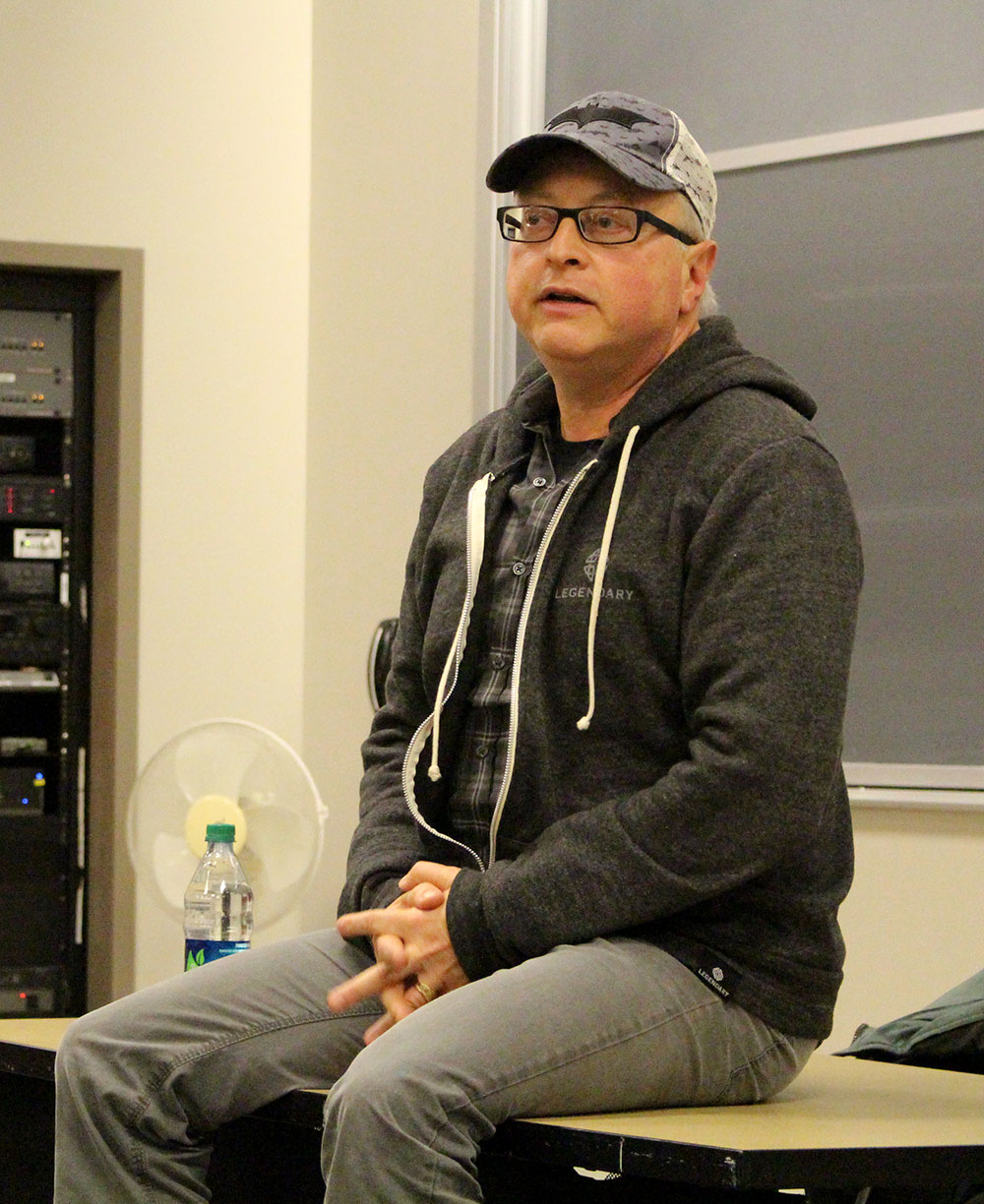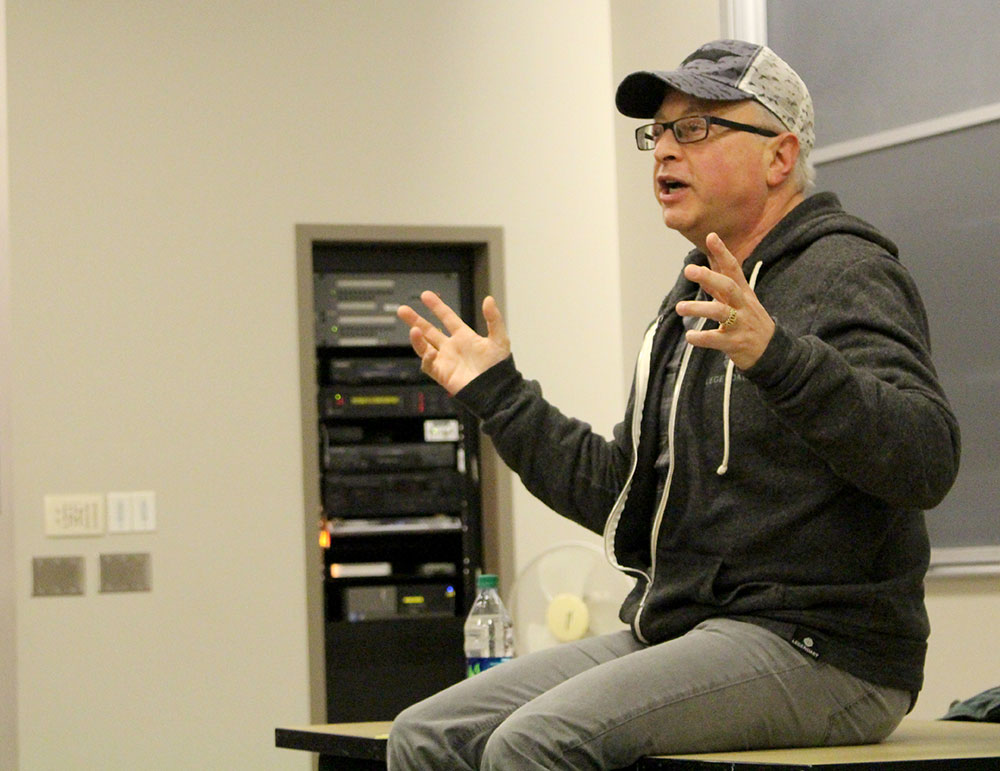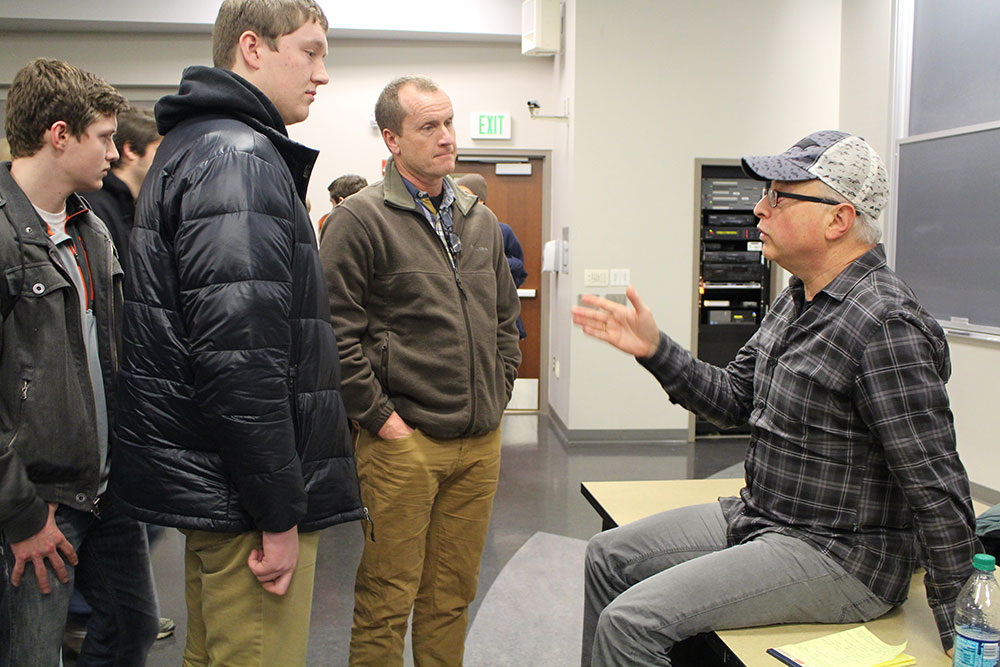Uslan advises Hollywood-bound students path will be ‘painful,’ rewarding

Michael Uslan, Batman producer and a professor of practice in The Media School, talked with students at Ernie Pyle Hall Feb. 4 about the changing world of media and the emergence of Asia as a challenger to the United States in entertainment.
Uslan, who taught T453 The Business of Producing Motion Pictures and T453 Writing for Graphic Novels, Comic Books and Animation in intensive sessions earlier this semester, said the entertainment industry’s gradual shift to an international market shouldn’t be ignored by students.
“The world is a village,” Uslan said. Emerging markets in Asia, Africa and South America are poised to upset Hollywood’s hold on the entertainment industry.
“The sleeping giant has awakened,” Uslan said. “It’s China.”
Uslan told students that cities like Shanghai and Beijing rival Hollywood in terms of technological and artistic capability. Uslan toured movie studios there half expecting to see something that resembled Cuba more than Hollywood.
Uslan said he was surprised to find that Chinese movie studios use state-of-the-art equipment that rivals anything in Hollywood.
“When you combine technology with an audience this big, everything changes,” Uslan said.
Uslan knows because he has more than three decades of experience working in Hollywood. He’s been the producer of every major Batman film since 1989, and that one took him 10 years to launch.
Uslan said that movies like Transformers: Age of Extinction in China are an example of technology combining with large new markets. The movie earned $300 million in China alone, and part of the reason was because the last third of the movie was shot in the country. Uslan said Chinese filmgoers loved that.
Uslan said collaborative cinematographic projects between these emerging nations are the future.
“The world is changing,” Uslan said. “Everyone in Hollywood is in a panic. They know they need to get involved, and they don’t know how to do it.”
Part of the reason the world is changing is the rapid industrialization of countries like China and India, and the established economic power of Korea, Japan and Singapore. A wave of talent has followed unprecedented funding by regional governments and companies to produce films and promote homegrown culture abroad.
Uslan said movie theaters are opening at such a rapid pace that China could overtake the U.S. as the biggest cinema market in the world by 2019.
But he said that’s opportune for students getting ready to graduate college.
“One of the great things about going into a world that’s changing is that no one knows what they’re doing,” Uslan said. “It’s the blind leading the blind.”

It’s a ripe market, but Uslan’s first words to the students in his classes weren’t of encouragement. In fact, he said they were deliberately discouraging.
“Go, run,” Uslan said he told his students. “Get out.”
Uslan used a tough love approach, telling students to abandon their interest in the entertainment industry because there is no job security, no guarantee of success, and a long, difficult road ahead.
“After I try to scare the bejeebies out of them, if they still insist they want to do it, then I know their chance of success is significant,” Uslan said.
Uslan said he wants to give students the opportunity he never had as an undergraduate at IU by sharing his experiences in Hollywood to show them the realities of the business, which are sometimes brutal.
“It’s going to be painful,” he told would-be film producers. “Not easy. Not quick. Are you willing to suffer for your dreams? Are you willing to get up off the couch and knock on doors until your knuckles bleed?”
None of his students decided to run away, he said. Instead, they gave him insight into their prospects and dreams.
“They have questions and concerns and uncertainties and confusion, all normal things that someone in college should have,” Uslan said.
He said he was impressed with the level of dedication his students showed in learning about the entertainment industry.
Uslan recalled being asked how to maintain one’s personal, moral and ethical code in Hollywood.
“Who even thinks to ask a question like that? And it’s a brilliant question,” he said. “So it’s been fascinating for me, too.”
But Uslan is worried about how universities across the country churn out graduates into a market for which they’re not prepared.
“You can’t send people out of film schools or telecom schools like lambs at the slaughter when they graduate, and they want to be a producer, a director, a writer, an actor, and they’ve never seen a contract for one,” Uslan said. “They’ve never seen their union agreement.
“I want them to be protected and understand it’s a business,” Uslan said of his goals as a teacher.
He said he hopes The Media School will keep this in mind as it develops because “it has to be that when you turn out graduates, they’re employable,” Uslan said. “That they actually have skill sets that are needed, usable immediately and could get them a job over a brilliant Ivy Leaguer.”

Savannah Miller, a freshman studying business management, asked Uslan during the lecture what it takes to be an actress. Uslan told her that the odds were stacked against her, and that if she wasn’t committed to it fully, then she likely wouldn’t succeed.
After the lecture, Miller said she appreciated the honesty.
“I kind of already knew it was going to be hard, and what he said reinforced it. But it gave me a little bit of hope,” she said. “But I like challenges. I’m up for it.”
Uslan said he wants all of his students to understand that commitment is key in the entertainment industry.
“I think success requires everything you have,” Uslan said. “I know nothing about shortcuts. I only know you work the hardest and longest you can possibly work.”
His advice?
“Get off the couch. Be proactive. Don’t let them get to you. Don’t let the bad guys win.”
More:

